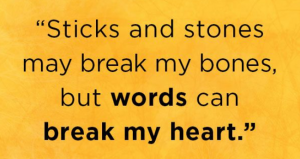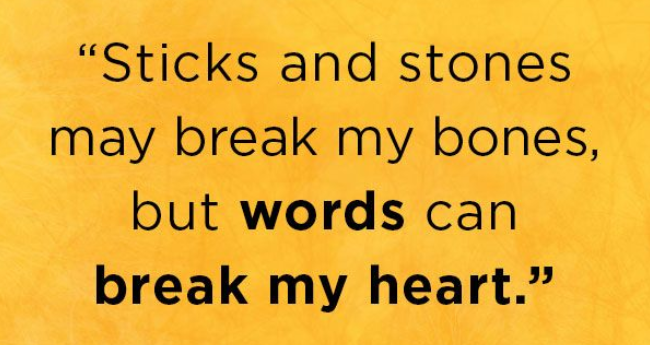Sticks and Stones . . .
Sticks and Stones . . .
 When I was in grade school during the 1960s, there was a common phrase that my classmates and I were encouraged to say when people called us names or said derogatory things to us:
When I was in grade school during the 1960s, there was a common phrase that my classmates and I were encouraged to say when people called us names or said derogatory things to us:
Sticks and stones may break my bones, but words will never hurt me.
The phrase was intended to help us develop the mental toughness and resiliency that was needed to neutralize the negative impact and feelings that resulted from the humiliation of being bullied by others. While there were good intentions associated with adults encouraging children to use that phrase, the phrase itself is a lie. The truth is that while broken bones heal over time, negative, demeaning, and hateful words can cause permanent damage to a person, relationship, community, or nation.
Here are some accurate examples of how the phrase could be modified:
● Sticks and stones may break my bones, but cruel words can ruin a marriage.
● Sticks and stones may break my bones, but words can start a war between nations.
● Sticks and stones may break my bones, but words can start a riot that results in burned buildings, looting, murder, and widespread destruction.
● Sticks and stones may break my bones, but words can cause a teenager to commit suicide.
If you are over the age of 50, you probably remember Bambi, a Disney movie about a young deer whose father is known as the Great Prince of the Forest who protects the animals in the forest from hunters. Bambi’s best friend, Thumper, is a young, mischievous rabbit who helps Bambi learn how to walk and speak. When I was a boy, my mom periodically repeated a famous quote that originated with Thumper:
If you can’t say something nice, don’t say anything at all.
Mom would repeat that quote when we made disparaging or critical comments about each other. She knew that words could harm other people, so she insisted that we keep our mouths shut when we didn’t have something nice or productive to say. When I was a teenager, Mom would sometimes remind us of another famous quote,
The Tongue is Mightier Than the Sword.
You may have heard of the book, The 7 Habits of Highly Effective People, which was written by Stephen Covey and published in 1989. The book was so popular that it sold more than 25 million copies worldwide and was published in 38 languages. One of my favorite quotes from the book is,
Words are like eggs dropped from great heights.
You could no more call them back than ignore
the mess they left when they fell.
We all know that just as words can be used to humiliate and demean people, they can also be used to encourage and bring hope to people.
One of the biggest problems we have in our “civilized society” is that over the past 60 years, a large share of the people in our country have become much more reckless in the way they use their words. This behavior has been facilitated by the internet and popular social media sites, which have allowed people to hide behind their digital devices while they hurl inflammatory comments and accusations at other people. This type of irresponsible behavior is intended to bully, intimidate, shame, and silence various people and groups.
Last week, in my article, Throwing Kindness and Charity Out the Window, I wrote about the frustration I experienced when I attempted to resolve an issue with a global corporation, Pitney Bowes. After spending more than an hour of my time on the phone with four different human robots, I finally blew up at the fifth person I talked to. Before I launched into a tirade, I said, You’re probably overwhelmed and doing twice the work that you should be doing. Unfortunately, that’s the nature of business today, so I’m not blaming you for any of this.
I later said, You sound like an intelligent man to me and I actually believe that you want to help me.
In addition to making those comments, I aggressively challenged him to do something no one else had agreed to do for me — take personal responsibility for my account and see to it that the people at Pitney Bowes did what they said they were going to do. He reluctantly agreed to assign himself to my account and monitor it until everything that needs to be done has been completed.
At the end of my article, I wrote,
There is a psychological technique that I used with him which acts as a subconscious trigger. The use of the technique usually creates a desire in the person to want to help me.
The psychological technique I was referring to was my comment about him doing twice the work he should be doing, and my belief that he is intelligent and wants to help me. In our current economic environment, the majority of people who work at the lower levels for corporations and businesses are expected to do twice the amount of work they would have been expected to do 30 years ago. One reason for this is because today’s businesses don’t employ as many people as they should because of their paper-thin profit margins.
When I tell a person who works for another company that they are probably overwhelmed and doing twice the work they should be doing, a switch is immediately triggered in their subconscious that automatically stimulates this personal realization:
Wow, this guy really understands what I’m going through. Nobody else understands what I go through every day — not my spouse, my family, my boss, no one… but this guy really understands.
Of course, this personal realization occurs within a flash — not at a conscious level, but at a subconscious level. Nobody really understands the full power of the brain and the speed at which it processes data.
My empathetic comment that led him to believe that I understood what he goes through every day and my comment about his intelligence and my belief that he wanted to help me, validated his feelings and beliefs about himself and made him want to help me.
How do you think he would have reacted if I had said,
I’m sick and tired of dealing with idiots like you. You’re a moron and you have no business working for Pitney Bowes. All you’re really qualified to do is flip burgers and make fries at McDonald’s, and even that job would be a challenge for an ignorant fool like you.
Do you think if I had said that to him he would have had a desire to help me? Or would he have done his best to get me off the phone or sabotage my efforts to resolve my problem?
We have great power over our fellow human beings, just by the words we use when we interact with them. What was it that our Savior told us? Oh yea, I remember:
Love one another as I have loved you.
Love your neighbor as yourself
The fact that we may be angry or upset with someone does not give us the right to insult, humiliate, and demean them. It does not cost us anything to show empathy toward others and to use words that are uplifting and encouraging.




